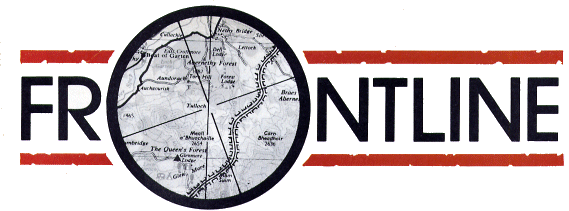

SEAN MONTgomerY ON THE RUN MASTERSON, ponders on the morality of wargaming in general and finds himself fighting fires in olde London
IT SEEMS as if not only is it all quiet on the western front this month, but on every front. Horror of horrors, is this column going to disappear into oblivion just when I had begun to make it worth while reading? Maybe — but just on the assumption that it won’t, I’ll take this month’s lack of review material as an opportunity to present a discussion for your consideration. It’s a subject which many have discussed before but not, to my knowledge, within the pages of CRASH, therefore it shouldn’t be redundant.
Consider the morality of wargames. When you load a wargame (no matter what the subject), your sole aim is to cooly and precisely kill people of conflicting ideologies. Many modern wargames bring this point closest to home with the subject of nuclear exchange. Now I’m not arguing that limited nuclear exchange is possible and that such a war could be won, but nevertheless do any of you pause before hitting the red button? Even in a game, would you rather lose before resorting to the most desperate means or is winning that important?
There are those who argue that wargaming is unhealthy because it breeds cynicism and callousness. Having been a wargamer for some years now, I often overheard conversations by table-top generals boasting about how they had won an engagement by ‘napalming the lot of them’ or ‘nuking them and got away with it.’ Then, in more conventional games there are those whose fumbling, incompetent handling of a situation causes them to throw entire units (or armies) away on lost causes. Or they fight to the death so they can say they have never surrendered. If you have come across any of these people, you can see why there are those who think the whole hobby is a perverse waste of time.
My argument would be that these boastful buffoons are the ones who have totally missed the point of wargaming. They are the egotistical bigots who exist in any society and have simply clung to wargaming to fulfil their need to sound superior. Unfortunately wargaming does attract rather more than its fair share of this sort. But wargaming, if it breeds anything, breeds pacifism. If there is any point to wargaming at all, then this must be it. Rarely does anyone win their first wargame. Instead they see their armies wiped out (usually by the computer) all because of the instructions they gave to their troops. They learn that it can be no fun to play with men’s lives. Or perhaps wargames can show the futility of war itself. Certainly, from an abstract point of view, they can discipline the mind and encourage logical thinking. But never, never should they be used as a vehicle to revel in the grotesquerie of the real thing.
It may be that you decide to employ nuclear weapons in a game and that as a result of your actions you win. But it should be important to remember that if the game makes such a victory possible, then it is only reflecting the designer’s philosophy and not hard fact. And the best, indeed ideal commander would be the one who could win a battle without any losses at all. That would be the most efficient and palatable victory. Obviously, as an ideal it is unlikely to be realised, even in a game. However, it can still act as a guideline and if you had to use even one small tactical nuclear device, it would have resulted in a phenomenal number of casualties. It should encourage you to find a better way next time.
I will leave you to consider this. I once had an Atari computer which meant I had access to SSI wargames (arguably the best home computer simulations in the world). I was playing Reforger 88, a tactical simulation of a Soviet invasion of West Germany, centred around the crucial Fulda Gap. I only won the game once. The East Germans began their advance and I immediately withdrew. The only combat which took place was air to air, where I fared well and suffered few casualties. At the end of the second turn, unopposed, the Soviets took Frankfurt. At this point, I called a truce. I was given a marginal victory.